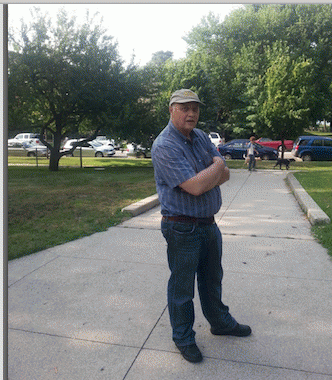My guest today is author and peace journalist, Bob Koehler. Welcome back to OpEdNews, Bob.
Joan Brunwasser: Your recent piece, Reflections on the Anthropocene, ventured into geology, not your usual beat. How come? What drew you in that direction?
Bob Koehler: Hi, Joan. It's great to be dialoguing with you again. And no, geology is not usually a topic I address. But the idea that Planet Earth may have entered a new geological era has been in the news recently. A working panel of geologists, meeting at the recent International Geological Conference in Cape Town, voted unanimously that it's time to declare the planet's transition beyond the Holocene epoch, where we've been since the last ice age, 12,000 years ago. This new era is characterized by changes to what might be called the planet's geological infrastructure, caused by human activity: nuclear testing, the planetary spread of plastics -- all the technological changes that have been leaving their mark on the planet during my lifetime. The geologists mark the beginning of the Anthropocene as the 1950s. My interest in this is hardly scientific. I write about peace. I write about human culture. But this deep shift that we are undergoing, as a planet, is profound and puts, it seems, everything else into perspective. As the geologists put it: Human beings are now in partnership with nature itself, co-creating the infrastructure of the natural world. What does this mean? I decided to wade into the unknown and write about it.
JB: I'm currently reading Timothy Egan's book, The Worst Hard Time: The Untold Story of Those Who Survived the Great American Dust Bowl. It won the National Book Award in 2006 but that's not what I want to talk about. First of all, we don't really learn about the Dust Bowl, our nation's worst natural disaster. The only thing I knew previously was that the Dust Bowl provided the backdrop for The Grapes of Wrath. That's it. But the Dust Bowl actually affected millions of people over a huge geographic area for a decade. The continual drought, followed by catastrophic and terrifying dusters* that literally stripped the farmland bare. After reading your piece, I thought to myself, here's a perfect example of misguided government policies affecting nature on a massive scale. Lands that had been lush for thousands of years were converted in short order to a barren wasteland. So, I respectfully suggest backdating the beginning of the Anthropocene by another two decades. The fact that we as a nation know nothing about it means that we can't learn anything from what happens when we behave out of harmony with nature. What do you think?
BK: What struck me about the concept of the Anthropocene is that it's an official acknowledgement by the world's scientific community that change on a deep and profound scale has occurred: not change caused by some outside force, e.g., a meteor strikes Planet Earth, or change as imagined by religious fantasy, e.g., God sends a flood to punish the human race, but change at that same absolute level -- nothing will ever be the same anymore -- caused by human behavior over a relatively short period of time. The phenomenon of the Dust Bowl is a perfect example of this sort of change. But my interest in learning about it and writing about it is political, social and spiritual, not scientific. If human power is so enormous that it is, in effect, godlike -- we can split the atom, we can blow the planet to smithereens, we can ravage and destroy the soil that nurtures life -- then it's time to link this power not to fear and greed but to our highest selves. I see my role as posing the question: What does this mean?
JB: Okay, question-poser. Can you take us a little farther on this path, please? What does it mean?
(Note: You can view every article as one long page if you sign up as an Advocate Member, or higher).






